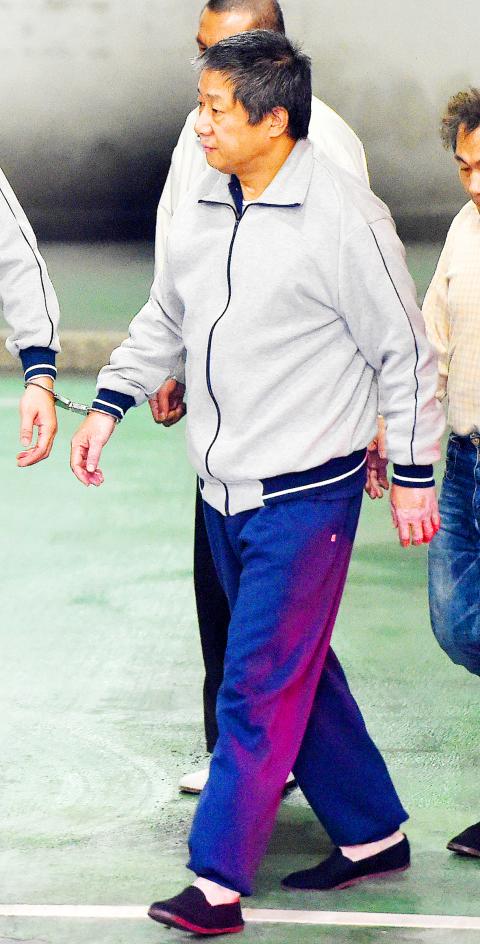The Legislative Yuan’s Judicial Committee is tomorrow to review a draft amendment to the Criminal Code proposed by Democratic Progressive Party (DPP) Legislator Wang Ding-yu (王定宇) stipulating that Chinese spies and their collaborators should be convicted of “offenses against the external security of the state” (外患罪).
None of the punishments stipulated in the Criminal Code of the Armed Forces (陸海空軍刑法), the National Security Act (國家安全法), the Classified National Security Information Protection Act (國家機密保護法) and the National Intelligence Services Act (國家情報工作法) are strict enough to deter spies, Wang said.
While those laws have been amended over the past few years to stipulate stricter penalties, they are still too lenient and have proven ineffective in deterring spies, he said.

Photo: Liao Chen-huei, Taipei Times
Former Chinese People’s Liberation Army intelligence officer Zhen Xiaojiang (鎮小江), the mastermind behind the nation’s most serious security breach, in 2015 received a four-year prison term under the National Security Act.
Retired major general Hsu Nai-chuan (許乃權) was given a 34-month sentence for colluding with Zhen, with his pension payments to resume once he leaves jail.
Had the pair been tried under the Criminal Code, they could have received a life sentence or the death penalty.
However, as the Constitution includes China in the nation’s territory, their crimes are not legally regarded as “foreign aggression.”
The bill aims to circumvent the legal obstacle by changing the wording in the Criminal Code addressing espionage from “foreign nations” (外國) to “foreign nations or the nation’s enemies” (外國或敵人) and from “enemy nations” (敵國) to “enemies” (敵人).
The bill defines “enemies” as “countries or organizations that engage in armed conflict or a military standoff with the Republic of China” (與中華民國交戰或武力對峙之國家或團體), the wording used in the Criminal Code of the Armed Forces.
Only by associating Chinese spies with offenses against the security of the state by a foreign aggressor can they be effectively curbed, Wang said.
Wang submitted the legislation in November last year, but the Chinese Nationalist Party (KMT) caucus struck it down 10 times before the DPP caucus on Tuesday voted to send it to committee review.
The Ministry of Justice said the laws are in place to punish any action that compromises national security or is against the nation’s interests.
It advised against amending the Criminal Code, saying that the wording in one of the bill’s articles alternates between “enemies” and “enemy nations” and includes “the nation,” which it called a loophole.

CHAOS: Iranians took to the streets playing celebratory music after reports of Khamenei’s death on Saturday, while mourners also gathered in Tehran yesterday Iranian Supreme Leader Ayatollah Ali Khamenei was killed in a major attack on Iran launched by Israel and the US, throwing the future of the Islamic republic into doubt and raising the risk of regional instability. Iranian state television and the state-run IRNA news agency announced the 86-year-old’s death early yesterday. US President Donald Trump said it gave Iranians their “greatest chance” to “take back” their country. The announcements came after a joint US and Israeli aerial bombardment that targeted Iranian military and governmental sites. Trump said the “heavy and pinpoint bombing” would continue through the week or as long

TRUST: The KMT said it respected the US’ timing and considerations, and hoped it would continue to honor its commitments to helping Taiwan bolster its defenses and deterrence US President Donald Trump is delaying a multibillion-dollar arms sale to Taiwan to ensure his visit to Beijing is successful, a New York Times report said. The weapons sales package has stalled in the US Department of State, the report said, citing US officials it did not identify. The White House has told agencies not to push forward ahead of Trump’s meeting with Chinese President Xi Jinping (習近平), it said. The two last month held a phone call to discuss trade and geopolitical flashpoints ahead of the summit. Xi raised the Taiwan issue and urged the US to handle arms sales to

BIG SPENDERS: Foreign investors bought the most Taiwan equities since 2005, signaling confidence that an AI boom would continue to benefit chipmakers Taiwan Semiconductor Manufacturing Co’s (TSMC, 台積電) market capitalization swelled to US$2 trillion for the first time following a 4.25 percent rally in its American depositary receipts (ADR) overnight, putting the world’s biggest contract chipmaker sixth on the list of the world’s biggest companies by market capitalization, just behind Amazon.com Inc. The site CompaniesMarketcap.com ranked TSMC ahead of Saudi Aramco and Meta Platforms Inc. The Taiwanese company’s ADRs on Tuesday surged to US$385.75 on the New York Stock Exchange, as strong demand for artificial intelligence (AI) applications led to chip supply constraints and boost revenue growth to record-breaking levels. Each TSMC ADR represents

State-run CPC Corp, Taiwan (CPC, 台灣中油) yesterday said that it had confirmed on Saturday night with its liquefied natural gas (LNG) and crude oil suppliers that shipments are proceeding as scheduled and that domestic supplies remain unaffected. The CPC yesterday announced the gasoline and diesel prices will rise by NT$0.2 and NT$0.4 per liter, respectively, starting Monday, citing Middle East tensions and blizzards in the eastern United States. CPC also iterated it has been reducing the proportion of crude oil imports from the Middle East and diversifying its supply sources in the past few years in response to geopolitical risks, expanding